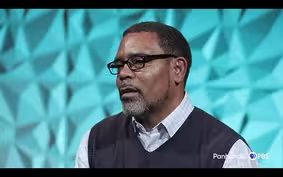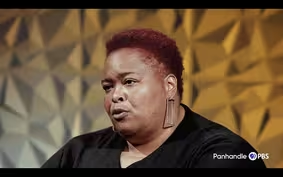Living While Black
What is white fragility?
Clip: 4/15/2021 | 6m 16sVideo has Closed Captions
A look at some of the common responses from white people in conversations about race.
A look at some of the common responses from white people when it comes to conversations about race.
Problems playing video? | Closed Captioning Feedback
Problems playing video? | Closed Captioning Feedback
Living While Black is a local public television program presented by Panhandle PBS
Living While Black
What is white fragility?
Clip: 4/15/2021 | 6m 16sVideo has Closed Captions
A look at some of the common responses from white people when it comes to conversations about race.
Problems playing video? | Closed Captioning Feedback
How to Watch Living While Black
Living While Black is available to stream on pbs.org and the free PBS App, available on iPhone, Apple TV, Android TV, Android smartphones, Amazon Fire TV, Amazon Fire Tablet, Roku, Samsung Smart TV, and Vizio.
Providing Support for PBS.org
Learn Moreabout PBS online sponsorship- People get upset if a group of African-Americans, you know, voice their concerns about the maltreatment, the mistreatment, the racial subjugation and oppression of our people.
And that disturbs me, because America is a nation of immigrants, it's a nation of many people of different races and creeds, religions and we should be able to be able to express our viewpoints.
- [Karen] White fragility.
What is that?
- It's just, it's the way white people respond when you talk to them about racism.
It's Dr. Robin de Angelo that actually wrote the book about white fragility.
And she talks about how when you talk about racism, the response from white people is almost textbook.
They bring up Black on Black crime.
They talk about, well, what about, you know, just many other examples in.
You know, those are some of the things that I used to think myself before I had biracial children.
- If you watch racial dialogues on television, they are not racial dialogues, they're racial monologues.
People do not connect with each other.
They get defensive, they defend their positions.
Very few times do you witness someone who'll say, I'm really sorry, what did I just do or say, tell me.
Everyone really has to begin to understand themselves as racial, cultural beings.
To understand what it means to be Black, what it means to be Asian-American, what it means to be Latinx American.
What does it mean to be white?
- I've heard several people from the white community say, you know, it's not a thing, it's not there.
It's a media-pushed agenda.
It's just something that's pushed to divide the country.
And I don't know how anybody, how any white person can say that, because we will never know.
To me, I always use the analogy of that's like a man telling you that having a baby doesn't hurt.
It's something that you absolutely never experience, and you really can't speak on it unless you've been there.
You know, even me as a woman with biracial children, I have like a very small percentage of understanding.
I see what they go through, but I'll never know what they're going through.
You know, I can educate my children and try to teach them as much as I can, but I can never teach them what it's like to be Black or viewed as Black in the community.
And so that's something for white people I think is important to know, that you can't, you'll never understand.
You can try your best to educate yourself and you can listen and you can sympathize, but you'll never fully understand.
- So when we say we want equal rights, it seems like we see Americans, white Americans especially.
you know, kind of speaking out and being ugly and rude.
And all we're saying is we don't want a handout, we want, we want equal rights.
And it seems like it becomes like, Hey, no, y'all want to take our jobs.
Y'all want to take our homes.
Y'all want to take this.
Y'all wanna destroy this.
And that's not what we are saying, but it feels and sounds like that when I'm dealing with white supremacy in America.
All we're just saying is we wanna be equal.
We wanna be treated as humans.
And I'm scared that, you know, they don't see it the same way.
- For people to feel upset or, you know, somehow disoriented by the fact that, you know, we wanna talk about the issues of policing and racial bias.
We wanna talk about the chokeholds or no-knock warrants, we wanna talk about the mandatory minimum sentencing.
You know, that doesn't make sense to me.
Like, have the conversation, understand that you may not have been oppressed but you can certainly respect someone who was part of a race that has been oppressed.
Sure, you may not have owned human beings and called them slaves, and no one is pointing the finger at you saying that you did, but be a part of the solution.
- No one is immune from inheriting the racial, gender, sexual orientation biases of our forebearers.
For me to believe that I have been born and raised in the United States for some seven decades or more, it's the height of naivety or ignorance to claim that I am completely bias free.
No one in this society was born at birth, yelling out that I wanna be a racist, I wanna be a sexist.
We took this on through a painful process of social conditioning.
And so all of us need to understand that we harbor implicit biases, that it doesn't make us a mean evil individuals.
Most people are good moral individuals who would consciously stand against racism, but don't realize that they harbor racist attitudes and feelings - Still, you know, still prevalent today.
That hate, that bigotry, the pure ignorance, that simply on the basis of someone looking different than you.
maybe worshiping different from you.
Mmybe speaking in a different language than you that they're a threat.
This is America, a nation of immigrants.
Unless you're a Native American, you're not native.
We need people to swallow their pride, admit that, and let's move forward together.
(soft music)
Video has Closed Captions
Clip: 4/15/2021 | 9m 31s | Amarillo residents discuss the best courses of action to take in order to make change. (9m 31s)
Video has Closed Captions
Clip: 4/15/2021 | 3m 15s | Black Amariloans discuss the importance of voting. (3m 15s)
What does it mean to be anti-racist?
Video has Closed Captions
Clip: 4/15/2021 | 3m 11s | What is the difference in being non-racist and anti-racist? Dr. Derald Wing Sue explains. (3m 11s)
Providing Support for PBS.org
Learn Moreabout PBS online sponsorshipSupport for PBS provided by:
Living While Black is a local public television program presented by Panhandle PBS


















